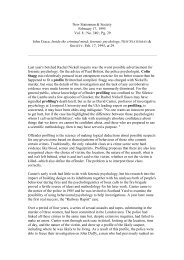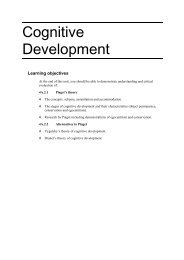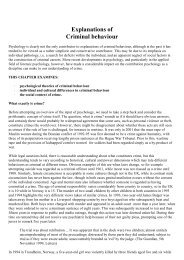Ch 11 - Jeff Standen
Ch 11 - Jeff Standen
Ch 11 - Jeff Standen
Create successful ePaper yourself
Turn your PDF publications into a flip-book with our unique Google optimized e-Paper software.
- M<br />
Models of abnormality<br />
diathesis-stress model states that psychological disorders<br />
result from an interaction between genes and the<br />
environment. Diathesis means a condition which makes an<br />
individual more susceptible to a disorder. When the<br />
diathesis - in this case a genetic predisposition - combines<br />
with certain life events such as stressors, the disorder is<br />
more likely to develop. The diathesis-stress model suggests<br />
that gene therapy, on its own, will not provide a 'magical<br />
cure' for psychological disorders.<br />
Electroconvulsive therapy (ECT) ECT involves passing an<br />
electric current through the brain which causes a brain<br />
seizure or convulsions. It is sometimes used in cases of<br />
severe depression, though less so nowadays, partly because<br />
of side effects such as memory loss. Although it appears to<br />
reduce symptoms of depression in around 60-70% of cases,<br />
it is not clear how ECT works. However, it is known to<br />
release a variety of neurotransmitters in the brain (Comer,<br />
1998).<br />
Brain surgery This is the most extreme biological treatment<br />
for psychological disorders. It has a long history starting<br />
with trepanning in prehistoric times, though today it is only<br />
used as a last resort.<br />
Evaluation of the biological model<br />
^<br />
Greater understanding In recent years, rapid advances in<br />
biochemistry and genetics have increased our understanding<br />
of the biological aspects of psychological disorders.<br />
However, this understanding is far from complete. The<br />
complexities of brain chemistry and human genetics have<br />
yet to be unravelled.<br />
Inconclusive evidence The evidence is inconclusive. To<br />
what extent does neurotransmitter activity cause<br />
psychological disorders? What contribution do genes make<br />
to the onset of psychological disorders? The short answer is<br />
we don't really know. As yet, no specific genes have been<br />
identified that make major contributions to psychological<br />
disorders. Available evidence suggests that many genes may<br />
contribute to psychological disorders, each having a<br />
relatively small effect. However, the picture is far from clear<br />
(Barlow & Durand, 1999).<br />
Reductionism This is the reduction of something to its most<br />
basic elements or parts. Can psychological disorders be<br />
reduced to biological factors, as extreme versions of the<br />
biological model suggest? The answer is probably no.<br />
Complex mental and emotional processes are unlikely to be<br />
caused solely by genes and neurotransmitters. At most,<br />
biological factors probably predispose people to<br />
psychological disorders as the diathesis-stress model<br />
suggests. In terms of this model, psychological disorders<br />
result from an interplay between biology and the<br />
environment.<br />
Cause and effect As noted in the case of the role of<br />
hormones in depression, some biological changes may<br />
result from, rather than cause, psychological disorders. For<br />
example, if someone jumps out at you in the dark, it is fear<br />
that causes the adrenaline rush, not the adrenaline that<br />
causes the fear. In certain cases, biochemical imbalances<br />
may be caused by (rather than causing) psychological<br />
disorders.<br />
The classification system Classification systems of<br />
psychological disorders are largely based on the biological<br />
or medical model. Critics question their claim to be<br />
objective and scientific for the following reasons. There are<br />
frequent and sudden changes in classifications including the<br />
appearance of new disorders, the re-classification of existing<br />
disorders, and the removal of other disorders - as in the<br />
case of homosexuality. At times these changes appear to<br />
reflect changes in attitudes in the wider society rather than<br />
the application of scientific knowledge.<br />
Treatment Many of the treatments suggested by the<br />
biological model have been criticised as unethical and<br />
ineffective. Drug treatment can have negative side effects. It<br />
can lead to physical and psychological dependence. In<br />
addition, it may only treat the symptoms of a disorder rather<br />
than its cause. For example, drugs may simply readjust<br />
neurotransmitter levels and do nothing about the situation<br />
which caused the disorder in the first place. Many<br />
researchers would agree with Ronald Comer that 'drugs<br />
alone do not provide a long-term solution' to most cases of<br />
psychological disorders (Comer, 1998).<br />
However, many psychiatrists and patients argue that drugs<br />
can relieve extremely distressing symptoms and place<br />
people in a better frame of mind to overcome their disorder<br />
(see Activity 1, Item B).<br />
A humane approach? Supporters of the biological model<br />
claim that it is more humane than other models. It portrays<br />
psychological disorder as illness - something that just<br />
happens to a person. No blame is attached to the individual<br />
for suffering from the disorder. This is in contrast to some<br />
psychological models which imply that people cannot cope<br />
with life or have brought their disorders upon themselves.<br />
However, critics are doubtful that it really helps to see<br />
disorders as illness, since this encourages the 'patient' to<br />
depend on the 'doctor' and not to take any personal<br />
responsibility for their own recovery.<br />
r<br />
Key terms<br />
Biological or medical model A model which states that<br />
psychological disorders are caused, at least in part, by<br />
biological factors such as neurotransmitter imbalance and<br />
genetic inheritance.<br />
Diathesis-stress model A model which states that<br />
psychological disorders are caused by an interaction between<br />
the environment and a condition - the diathesis - which<br />
makes people more susceptible to disorders.







